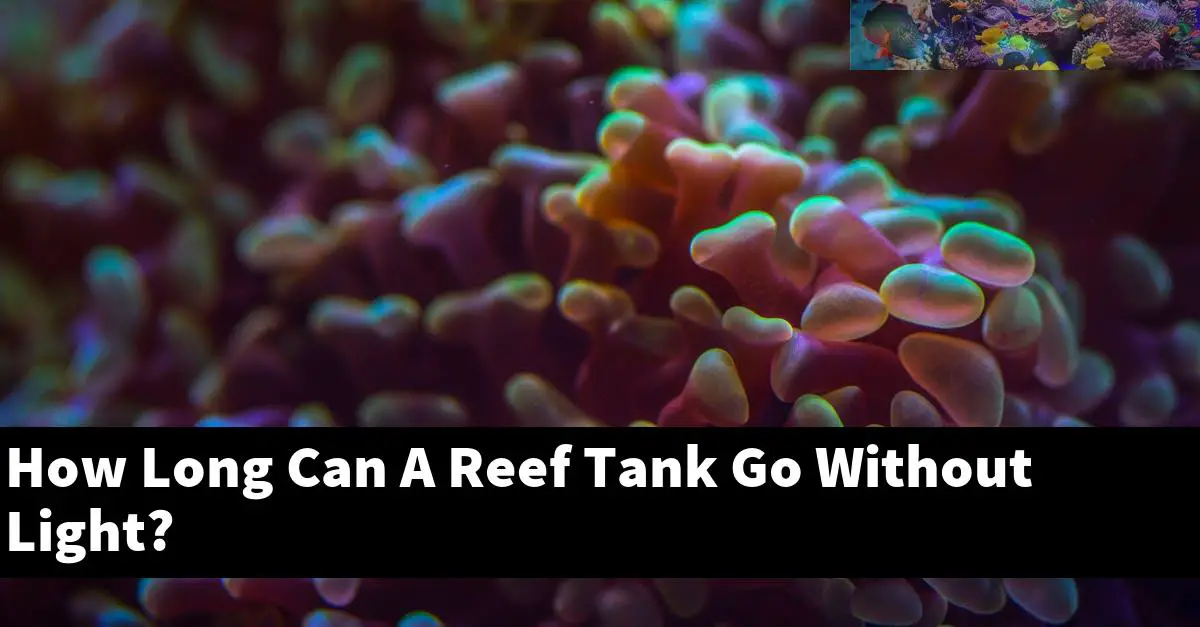A reef tank can go without light for two weeks, but it is not recommended to do so for extended periods of time. If a reef tank is without light for too long, the corals and other organisms will begin to die.
How long can a reef tank go without light before the corals start to suffer?
Reefs can typically go for about two weeks without light before corals start suffering. This is because corals need light to photosynthesize and produce energy.
Without light, the corals will start to starve and may start to turn white or brown.
What are the consequences of having a reef tank with no light?
A reef tank with no light will likely experience a decline in coral growth and reproduction. Without the fluorescent light shining down on the corals, they will not be able to produce the necessary photosynthesis to survive.
In addition, the fish that live in a reef tank typically require a good amount of light to hunt and eat, and will likely be unable to survive in a tank without any. Finally, without the light shining down on the coral, it will be more difficult for the coral to protect itself from disease and parasites.
How long can a reef tank go without light before the fish start to die?
A reef tank can go without light for a period of time, but it’s important to replace the light bulbs every six months or so to keep the fish healthy. Over time, without the UV light from the lights, the fish will start to die.
What happens to a reef tank when there is no light?
When there is no light, the corals will go into a dormant state and will not be able to photosynthesize. This will eventually lead to their death.
In order for the coral to survive, they will need to be re-exposed to light. This can be done by adding a light to the tank or by moving the coral to a tank with light.
Why is it important to have light in a reef tank?
A healthy reef tank needs adequate light to perform its vital functions. A variety of organisms, including coral and fish, photosynthesize using light energy to produce food.
In a properly illuminated reef tank, the coral and fish can thrive and reproduce. Reef tanks also benefit from the light because they create a natural daytime and nighttime environment.
During the day, light provides a natural stimulus for coral growth and reproduction. At night, the darkness provides a natural safety valve for reef tanks, preventing over-fishing and other disturbances.
In addition to providing coral and fish with the necessary light to survive, a reef tank with adequate light can also help to improve the fish’s coloration and behavior.
What are some of the problems that can occur in a reef tank without light?
There are a few problems that can occur in a reef tank without light. One is that the coral will not be able to photosynthesize, meaning they will not be able to produce their own food.
This can lead to a decline in the population of coral over time. Additionally, the fish will not be able to find food and will not be able to thrive.
Finally, the environment will be less stable and will be more susceptible to fluctuations in water temperature and ph.
How can you prevent problems in your reef tank when there is no light?
There are a few ways to prevent problems when there is no light in a reef tank. One is to use light-emitting diodes (LEDs) as supplemental light.
Led lights are energy-efficient and last longer than traditional lighting sources, such as fluorescent light. They are also more versatile, allowing you to control their intensity and color.
Another way to prevent problems with a reef tank when there is no light is to use a night light. A night light simulates the natural light of the moon and stars and can help to keep your reef tank illuminated at night.
How many hours of darkness do corals need?
It depends on the type of coral. Some corals do well in high levels of light, while others need low levels of light or complete darkness.
In order to keep your corals healthy, it is important to provide them with the darkness they need. In most cases, this means keeping your tank lights off for at least 8 hours each night.
If you can’t provide your tank with complete darkness, you can try using a black-out curtain to minimize light exposure.
Summary
A reef tank needs light to survive, and if it is not kept lit, the coral animals will die.

